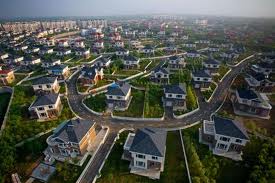 (U.S.News & World Report ) There are more than 2.4 million homes for sale in the United States and even more in the foreclosure pipeline, and yet builders are still putting up new houses, according to recent construction data. Why? It all comes down to the location and condition of existing homes on the market, many of which aren't appealing or suitable for buyers today, experts say. "Many dwellings built during the boom years--whether now offered for sale by banks or homeowners wishing to move--are in the wrong locations or badly configured," Peter Morici, professor of economics at the University of Maryland, wrote in an E-mail. "Much of that housing was premised on cheap energy--far from jobs and requiring long commutes and expensive to heat." With gas prices hitting record highs the past few years, long commutes into city centers are becoming pricier, and current and future homeowners are thinking more about proximity to work and play when looking for housing. There's a new emphasis on smaller, better located homes, Morici says, prompting more construction of multi-family residences closer to cities. The legacy of the housing bubble and the still-unsteady jobs market has also played a role. "Many young workers may need to move to stay employed and are wary of being tied to a house they may not be able to sell," Morici says. "Hence, more young families are opting to rent." All of this adds up to more challenges for the housing market when it comes to selling through the enormous overhang of supply, and calls into the question the dynamics of the housing market going forward. After all, rental housing tends to be concentrated in urban areas, not the suburbs. So does a new preference (and in some cases necessity) to rent mean an end to suburbs and a revival of downtown, city living? It's too soon to tell, but probably not, says Jed Kolko, chief economist at real estate website Trulia, who attributes the recent uptick in rental demand to shorter-term causes such as tight credit and a bad labor market. "Right now people aren't in a good position to buy homes so there's more demand for renting," Kolko says. "But that doesn't necessarily mean a long-term shift away from suburbs." That's because whereas in previous times jobs were concentrated in downtown city centers, over time many jobs have moved to suburbs. While that trend could slow if things such as high gas prices or other rules and regulations come into play, the hefty price tag of the convenience and walkability of more urban settings will likely support continued demand for property in cheaper suburbs. "Even though people say they'd like to live walking distance to all the restaurants, when they start looking at prices and make decisions, they realize [it] often comes at a high price," Kolko says. "People want as much house for the dollar as they can get." Read more from yahoo.com
(U.S.News & World Report ) There are more than 2.4 million homes for sale in the United States and even more in the foreclosure pipeline, and yet builders are still putting up new houses, according to recent construction data. Why? It all comes down to the location and condition of existing homes on the market, many of which aren't appealing or suitable for buyers today, experts say. "Many dwellings built during the boom years--whether now offered for sale by banks or homeowners wishing to move--are in the wrong locations or badly configured," Peter Morici, professor of economics at the University of Maryland, wrote in an E-mail. "Much of that housing was premised on cheap energy--far from jobs and requiring long commutes and expensive to heat." With gas prices hitting record highs the past few years, long commutes into city centers are becoming pricier, and current and future homeowners are thinking more about proximity to work and play when looking for housing. There's a new emphasis on smaller, better located homes, Morici says, prompting more construction of multi-family residences closer to cities. The legacy of the housing bubble and the still-unsteady jobs market has also played a role. "Many young workers may need to move to stay employed and are wary of being tied to a house they may not be able to sell," Morici says. "Hence, more young families are opting to rent." All of this adds up to more challenges for the housing market when it comes to selling through the enormous overhang of supply, and calls into the question the dynamics of the housing market going forward. After all, rental housing tends to be concentrated in urban areas, not the suburbs. So does a new preference (and in some cases necessity) to rent mean an end to suburbs and a revival of downtown, city living? It's too soon to tell, but probably not, says Jed Kolko, chief economist at real estate website Trulia, who attributes the recent uptick in rental demand to shorter-term causes such as tight credit and a bad labor market. "Right now people aren't in a good position to buy homes so there's more demand for renting," Kolko says. "But that doesn't necessarily mean a long-term shift away from suburbs." That's because whereas in previous times jobs were concentrated in downtown city centers, over time many jobs have moved to suburbs. While that trend could slow if things such as high gas prices or other rules and regulations come into play, the hefty price tag of the convenience and walkability of more urban settings will likely support continued demand for property in cheaper suburbs. "Even though people say they'd like to live walking distance to all the restaurants, when they start looking at prices and make decisions, they realize [it] often comes at a high price," Kolko says. "People want as much house for the dollar as they can get." Read more from yahoo.com



